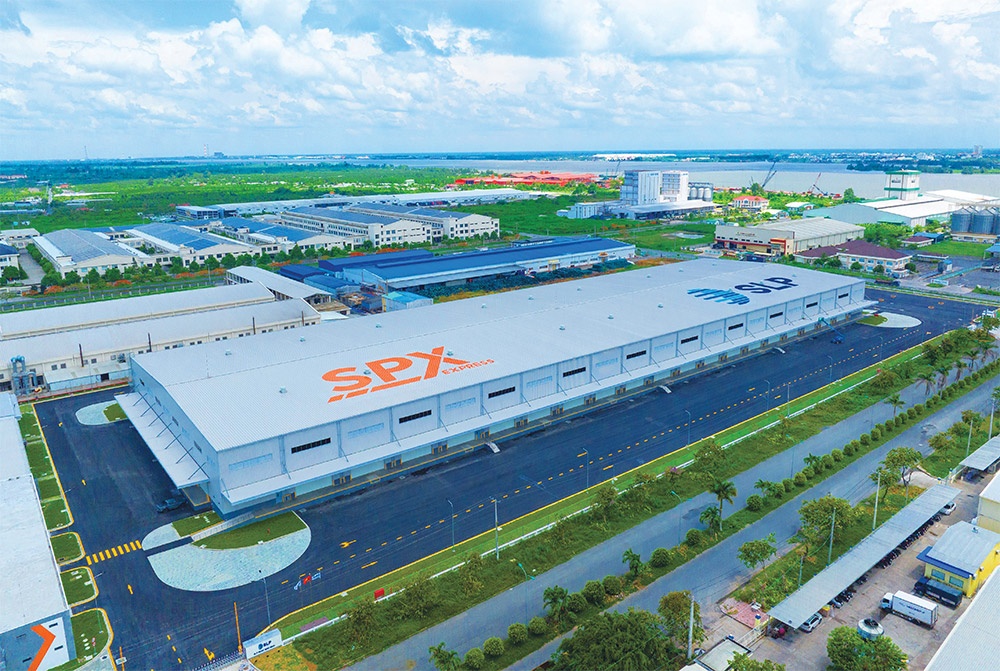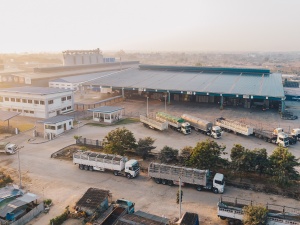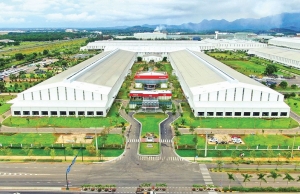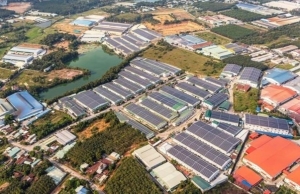Reforms essential for industrial M&As
Nguyen Van Hai, legal head at the Investment Promotion and Connection Agency under the Vietnam Mergers and Acquisitions Community (M&A Vietnam) met with his potential investors on January 24 to discuss new industrial property M&As after the amended Land Land was announced.
“Many of them have been waiting for this moment for a long time. This law will reinforce the legal framework for industrial property M&A and increase investor confidence, including in industrial property,” he said.
“The M&A community is eager to make moves after the news. Previously, we worked with a number of businesses and investors who said that they will make next steps in industrial assets via M&As when the amended Land Law was passed.”
He went on to say that other laws and regulations like the amended Law on Real Estate Business would support the development of the market, as well as M&A activities in the industrial property segment this year. M&A Vietnam now has more than 20,000 members globally.
 |
| Vietnam’s current and potential cross-border deals are helping to foster growing demand in industrial property here Photo: Le Toan |
Although the property market last year saw the number of newly established companies decrease by 45 per cent from 2022, and the number of bankruptcies increased, the industrial property M&A segment was a highlight.
Vu Thi Thu Ha, director of law firm ATS, said that more than 1,000 M&A transactions were completed in the segment last year with a value of more than $3.1 billion. “This figure can give us confidence that 2024 will have certain improvements,” Ha said.
Le Dinh Chung, deputy general director of property developer SGO Group, added that Vietnam had signed comprehensive cooperation agreements with many countries, which would lead to an increase in foreign investment in the country and growing demands in industrial property.
“This will be a year of stronger development in this segment. Many players from Japan, South Korea, Singapore, Taiwan, and Hong Kong are focusing on investing,” he noted. “This will continue to be a trend in the years to come. The adoption of the land law will be a supporting factor to the development of the segment. However, to enable its effectiveness, enforcement should be paid due attention to ensure consistency.”
Dr. Nguyen Van Tuan, partner at LNT & Partners, said that real estate M&As will be affected by a number of laws that will take effect in 2025.
“The Law on Real Estate Business partly solves previous legal problems. For example, it has a new regulation, which states that parties in M&A transactions can transfer real estate projects without fulfilling financial obligations. This is an open rule,” he said. “It also increases transparency in real estate transactions.”
Despite the improvements, the enforcement of laws remains a concern among businesses and experts.
Vu Thi Thu Ha explained that she faced many challenges because of different understanding and applications among cities, provinces, and agencies.
“In many cases, it feels like I am hitting my head against a brick wall because of this different understanding and performance. Some cases are simply stuck. New laws cannot support the market much if they are not enforced properly,” she said.
Jean-Jacques Bouflet, vice chairman in charge of advocacy at the European Chamber of Commerce in Vietnam said it endorses legal reforms to promote investments in condotels, hometels, and officetels. He also suggested including clear guidelines on land use terms and the granting of land use right certificates, which may augment the interest of foreign investors to put their money into Vietnamese real estate.
“These reforms, among others, are essential to boost the real estate market and contribute to Vietnam’s social security, continuous growth, and increasing sustainability,” Bouflet said. “Additionally, to further the protection of foreign investors’ rights, we recommend expediting the issuance of certificates in practice. This also pertains to the publication of a foreign ownership prohibited projects list that will increase the transparency of the Vietnamese real estate market for foreign investors.”
| Le Na, FDI Advisory Vietnam UOB The Vietnamese market now sees the trend of buying minority or majority shares among foreign investors instead of buying 100 per cent as they did earlier. Singapore’s businesses are eying M&A transactions in traditional industries such as logistics, industrial park development. Sembcorp Industries is an example, with the company developing many green and smart facilities in Vietnam. In 2024, the trend will focus more on sustainable development and technology. They are seeking Vietnamese businesses that can comply with international development standards. Tuan Vu, Senior associate AGS Consulting Japan’s population is rapidly ageing, so they want to look to foreign markets. In Southeast Asia, Vietnam is considered a potential M&A market for Japanese investors because Vietnam has good GDP growth, stable politics, and many Japanese product lovers. In 2022, Japanese financial backers bought over 130 companies in Southeast Asia, including 48 Singaporean companies and 28 Vietnamese ones. Vietnam, thus, stands higher than Thailand, Malaysia, and Indonesia. Last year up to the end of September, they bought 78 companies in Southeast Asia, including 35 Singaporean companies and 12 Vietnamese ones. This year, the industries that are expected to draw a lot of attention from Japanese businesses include logistics; warehouses as many companies have moved factories to Vietnam, thus increasing warehouse demands; and healthcare. In the first seven months of 2023, the number of M&A deals in healthcare in Vietnam reached more than $400 million. Japanese investors see Vietnam as a potential market due to increased demands for high-tech healthcare. Lately, we have received many requests from Japanese companies who are seeking to back companies providing services to hospitals, and medical facilities. Japanese investors often strongly focus and spend a lot of time on letters of intent, and when issuing this, about 90 per cent of deals are successful. Meanwhile, Chinese and South Korean investors who issue letters of intent quickly, without legal constraints, but have a high abandonment rate. Hoang Anh Nguyen, M&A manager INMERGERS Currently, there are great M&A demands from investors, but they still find it difficult to find companies that suit their needs. There are three important points that Vietnamese businesses need to change if they want to do more M&As with foreign investors. Firstly, they should change their mindset about timing. Vietnamese enterprises often consider M&As when their businesses are in a downturn. Meanwhile, foreign investors wish to find businesses that are in the process of growth. Secondly, before any deal, they should find a consulting unit to support the process, procedures, and transaction structure to approach the most favourable investors. Thirdly, they need to ensure financial transparency to create trust for investors. They are still worried that Vietnamese businesses always have two different accounting systems, and they think that it is not transparent. |
 | Industrial real estate witnesses robust growth in Q3 Vietnam's industrial real estate sector has shown remarkable signs of growth in the third quarter of 2023, with substantial new project launches contributing significantly to the market. |
 | More investment expected within industrial property Industrial property has been one of the hottest segments for mergers and acquisitions over the last two years. Bich Ngoc spoke with Marco Forster, head of ASEAN Advisory at Dezan Shira & Associates, on his assessment of the sector. |
 | Industrial property to heat up as it takes on neighbours Although it was the segment achieving the best growth in property in 2023, industrial real estate is forecast to face many uphill battles in 2024. |
 | Industrial real estate market thriving on FDI flow: insiders Despite formidable challenges for the real estate market in 2023, industrial property market has stood out as a bright spot that has maintained its growth momentum on the back of the foreign direct investment (FDI) flow, according to insiders. |
What the stars mean:
★ Poor ★ ★ Promising ★★★ Good ★★★★ Very good ★★★★★ Exceptional
Related Contents
Latest News
More News
- Construction firms poised for growth on public investment and capital market support (February 11, 2026 | 11:38)
- Mitsubishi acquires Thuan An 1 residential development from PDR (February 09, 2026 | 08:00)
- Frasers Property and GELEX Infrastructure propose new joint venture (February 07, 2026 | 15:00)
- Sun Group led consortium selected as investor for new urban area (February 06, 2026 | 15:20)
- Vietnam breaks into Top 10 countries and regions for LEED outside the US (February 05, 2026 | 17:56)
- Fairmont opens first Vietnam property in Hanoi (February 04, 2026 | 16:09)
- Real estate investment trusts pivotal for long-term success (February 02, 2026 | 11:09)
- Dong Nai experiences shifting expectations and new industrial cycle (January 28, 2026 | 09:00)
- An Phat 5 Industrial Park targets ESG-driven investors in Hai Phong (January 26, 2026 | 08:30)
- Decree opens incentives for green urban development (January 24, 2026 | 11:18)

 Tag:
Tag:![[Infographic] AMATA: Industrial and Smart City Developer](https://vir.com.vn/stores/news_dataimages/2026/022026/12/16/croped/amata-industrial-and-smart-city-developer-20260212165823.jpg?260212050401)





















 Mobile Version
Mobile Version